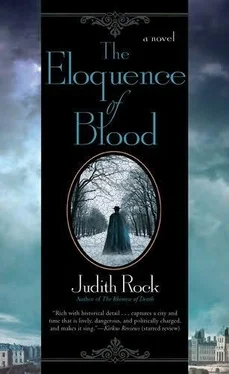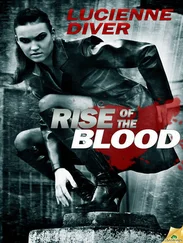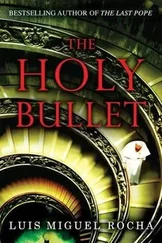Judith Rock - The Eloquence of Blood
Здесь есть возможность читать онлайн «Judith Rock - The Eloquence of Blood» весь текст электронной книги совершенно бесплатно (целиком полную версию без сокращений). В некоторых случаях можно слушать аудио, скачать через торрент в формате fb2 и присутствует краткое содержание. Жанр: Исторический детектив, на английском языке. Описание произведения, (предисловие) а так же отзывы посетителей доступны на портале библиотеки ЛибКат.
- Название:The Eloquence of Blood
- Автор:
- Жанр:
- Год:неизвестен
- ISBN:нет данных
- Рейтинг книги:5 / 5. Голосов: 1
-
Избранное:Добавить в избранное
- Отзывы:
-
Ваша оценка:
- 100
- 1
- 2
- 3
- 4
- 5
The Eloquence of Blood: краткое содержание, описание и аннотация
Предлагаем к чтению аннотацию, описание, краткое содержание или предисловие (зависит от того, что написал сам автор книги «The Eloquence of Blood»). Если вы не нашли необходимую информацию о книге — напишите в комментариях, мы постараемся отыскать её.
The Eloquence of Blood — читать онлайн бесплатно полную книгу (весь текст) целиком
Ниже представлен текст книги, разбитый по страницам. Система сохранения места последней прочитанной страницы, позволяет с удобством читать онлайн бесплатно книгу «The Eloquence of Blood», без необходимости каждый раз заново искать на чём Вы остановились. Поставьте закладку, и сможете в любой момент перейти на страницу, на которой закончили чтение.
Интервал:
Закладка:
Charles was nearly at the college when he saw a huddle of beggars in the street ahead of him, outside the church of St. Etienne des Gres. A halting voice came from their midst, and he realized that someone was reading aloud. A man hushed a chattering woman, who hit him and started pushing her way out of the huddle. The reader’s voice grew louder. “Elle etait riche, elle est morte, les Jesuites dansent sur son corps…”
Bursting from the group nearly in Charles’s path, the woman who’d been hushed screeched, “Here’s one, here’s a Jesuit vulture! But he can’t eat us, we’ve no gold for his guts!”
The others turned and Charles saw that the reader was the young man who’d pleaded for the old beggar on Christmas Eve. When he saw Charles, his eyes grew round with fear and he dropped the sheet of paper and backed away. Some of the beggars started singing the words of the tavern song, but the old man who’d attacked the Conde’s reliquary limped close to Charles, thrust his head forward, and squinted at him.
“Shut your mouths,” he yelled over his shoulder. “This death-bird gives good alms, he gave me this coat.”
Charles picked up the broadsheet from the cobbles and smiled reassuringly at the reader.
“Where did you get this, mon ami?”
The young man ran. Seeming to catch his fear, the others ran, too, and the old man limped after them, yelling at them to stop and cursing them for idiots. They rounded the corner of St. Etienne des Gres and Charles followed them, wondering suddenly where they sheltered. But in the scant moments it took him to reach the side street that ran in front of the college of Les Cholets, they disappeared. He turned back to the rue St. Jacques, studying the broadsheet as he went. This sheet, at least, still had only the one verse, which was somewhat reassuring. No printer’s name, of course-no one would put his name to an effort to stir up unrest and disturb the city’s peace.
As Charles neared the postern door, a shop sign on the college facade creaked in a burst of wind. Charles looked up. The sign’s crusty, golden loaf of bread made him smile, thinking of the LeClercs, the family of bakers who rented the shop and its living quarters. Mme LeClerc and her small daughter Marie-Ange had taken him to their hearts when he arrived last summer, helping him when he’d sorely needed it. The family should soon be back in Paris from their Christmas visit to M. LeClerc’s brother in the nearby village of Gonesse.
His spirits lightened a little by that thought, Charles went to the rector’s office, where he found Pere Le Picart sitting by the fireplace, his breviary in his hand.
“I see news in your face, Maitre du Luc,” Le Picart said. “Please, sit.”
Charles took the chair on the other side of the hearth and loosened his cloak. “News indeed, mon pere. Henri Brion is dead. Stabbed to the heart.”
Le Picart crossed himself. “Brion? Dear God. So that is why the poor man never came to see me?”
“I don’t know how long he’s been dead. A beggar found him in a midden ditch near the Place Maubert. Someone came from the Brion house to tell me, and I’m just back from seeing the body.”
“May God receive his soul. This is the last thing I expected! Certainly the last thing we needed. Of course,” he added dryly, “poor Monsieur Brion hardly needed it, either. Were the police there? Is there any thought of who killed him? Or why?”
“Lieutenant-General La Reynie was there. He has gone to question a goldsmith called Bizeul who, according to one of The Procope’s waiters, took Brion forcibly out of the coffeehouse on Thursday night. The waiter and a woman who was begging at the coffeehouse door say that this Bizeul and another man pretended that Brion was drunk, but he wasn’t. And since then, no one seems to have seen Brion alive.”
Le Picart frowned thoughtfully. “A notary may come to know financial secrets, after all.”
“True. Though family secrets are often more deadly.”
“So you don’t suspect this goldsmith?”
“He must be suspected, if it is true that he took Henri Brion forcibly out of the coffeehouse. But I can imagine no reason for him to have killed the girl. I cannot help but think that there is only one killer. Martine Mynette and Brion were both stabbed. Their lives were joined in family friendship as well as in the donation entre vifs transaction. For both to die on the same day is too much coincidence.”
“I agree. So who had reason to kill them both?”
“The most obvious answer is Henri Brion’s son, Gilles,” Charles said reluctantly. “His father was trying to force him into a marriage with the Mynette girl. And if he killed only the girl, his father would surely have tried to force him to court another heiress. But from the little I’ve seen of Gilles Brion, I simply cannot imagine him as a killer.”
“Anyone may be tempted to kill. And until we find the person who has been so tempted,” Le Picart said grimly, “the connections between the two victims mean that Brion’s death will be laid at our door along with Martine Mynette’s.”
They were both quiet under the weight of that certainty. The dim light through the small window’s greenish glass made the rector’s face look even more tired and drawn than it was.
The quiet was broken by a knock at the door. The rector gave permission to enter and a lay brother came in, holding out a folded piece of paper.
“This was left with the porter, mon pere. For Pere Damiot.” He handed the folded paper to Le Picart, bowed, clasped his hands against his apron skirt, and composed himself to wait.
“Please excuse me, Maitre du Luc.” Le Picart opened the letter and scanned the page. Like the older religious orders, the Society of Jesus required that any letter sent to or written by a Jesuit be read by a superior. When he finished reading, he stared open-mouthed at the page in his hand. “Unbelievable,” he breathed. Still looking at the letter, he said to the lay brother, “Mon frere, bring Pere Damiot to me, please.”
The brother bowed and went out.
“Well,” Le Picart said, looking up. He seemed more at a loss for words than Charles had ever seen him. “Well. This suggests that your initial impression of Gilles Brion may be correct, maitre. But we must wait until Pere Damiot has read this, since it is written to him.”
“Of course, mon pere.”
“A goldsmith,” Le Picart murmured to himself, thoughtfully tapping a finger on the letter in his lap. “Very likely.”
Charles folded his hands tightly in his lap to keep himself from snatching the letter and devouring it.
“Mon pere,” he said after a moment, both to take his mind off the letter and also because he needed to relieve his conscience, “after Monsieur La Reynie finished examining Brion’s body, he asked me to go with him to talk to the people at Procope’s. I went. I sat with him and drank coffee. I felt it was part of doing the task you’ve set me. But-well-it is a coffeehouse.”
The rector sighed. “Maitre du Luc.” He sounded as though he were talking to a sixteen-year-old novice. “I am not aware that Rome has condemned coffee.” He smiled at Charles. “Rather the contrary, if gossip serves.”
“Oh, yes?” Charles was momentarily diverted by the thought of His Holiness in papal tiara, sipping coffee in some Roman Procope’s.
“You are pursuing these questions at my express order, maitre. Where the questions take you, you will go. I charge you only to remember that Monsieur La Reynie pursues his own interests first and last.”
A flurry of knocking came at the door, and Pere Damiot was inside almost before Le Picart could bid him enter. His thin, olive-skinned face was alight with curiosity.
“Yes, mon pere? A letter for me?”
Читать дальшеИнтервал:
Закладка:
Похожие книги на «The Eloquence of Blood»
Представляем Вашему вниманию похожие книги на «The Eloquence of Blood» списком для выбора. Мы отобрали схожую по названию и смыслу литературу в надежде предоставить читателям больше вариантов отыскать новые, интересные, ещё непрочитанные произведения.
Обсуждение, отзывы о книге «The Eloquence of Blood» и просто собственные мнения читателей. Оставьте ваши комментарии, напишите, что Вы думаете о произведении, его смысле или главных героях. Укажите что конкретно понравилось, а что нет, и почему Вы так считаете.












